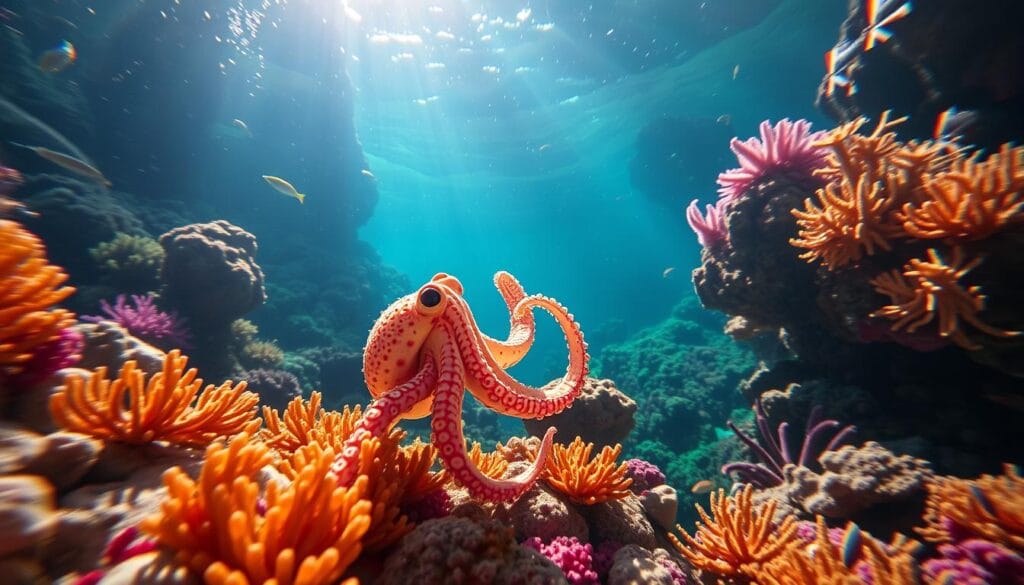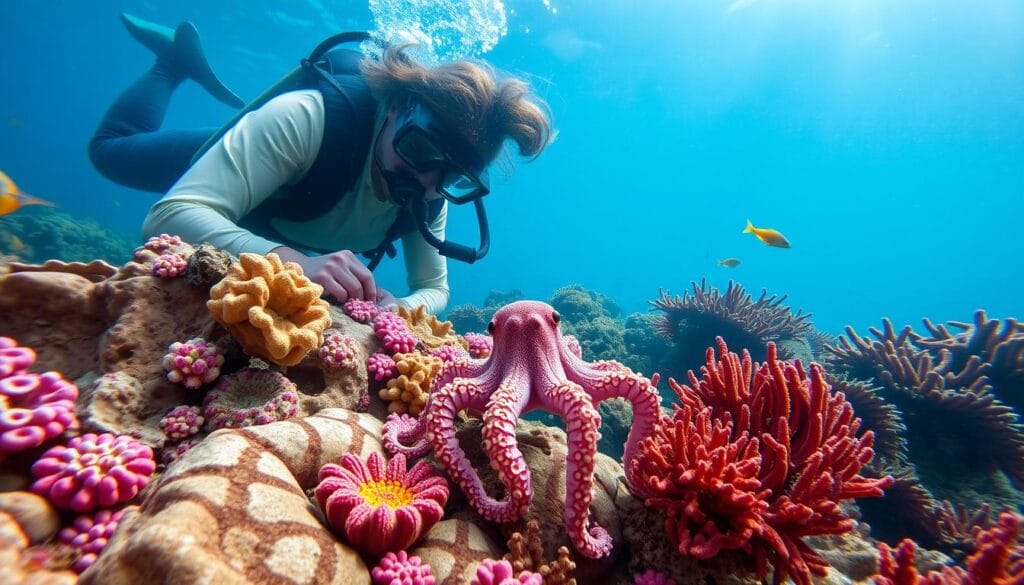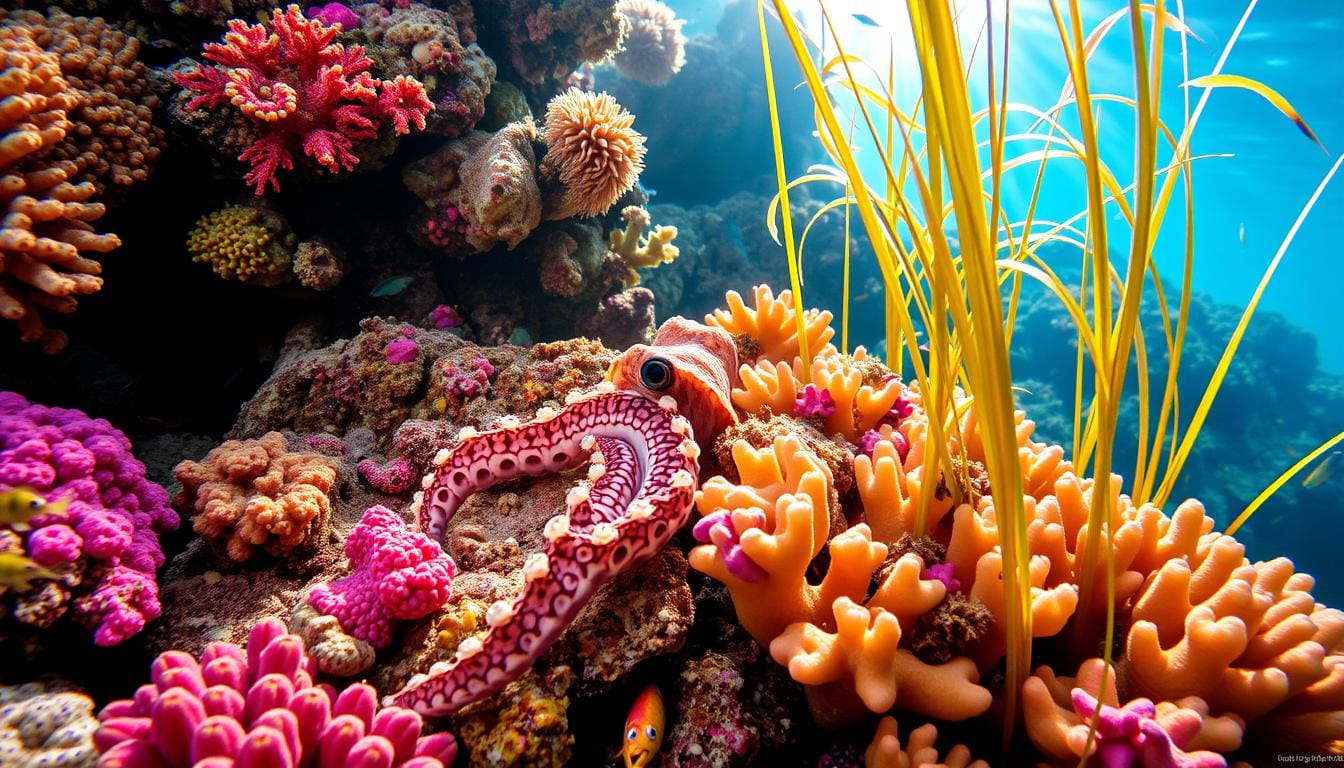Imagine a creature so small yet so extraordinary. The Atlantic Pygmy Octopus is a tiny marvel of the sea. It invites you to explore its fascinating world of intelligence and survival.
This small octopus species in the Atlantic is incredibly adaptable. It packs incredible abilities into a compact package just inches long.
Your journey into the Atlantic Pygmy Octopus lifestyle begins with understanding its remarkable characteristics. Despite its small size, this octopus is incredibly intelligent. It can solve complex puzzles and change colors with remarkable precision.
The Atlantic Pygmy Octopus represents nature’s incredible design of survival and adaptation. It shows us how small creatures can be mighty.
Table of Contents
Overview of the Atlantic Pygmy Octopus
Explore the amazing world of the Atlantic Pygmy Octopus. It’s one of the ocean’s smallest and most fascinating creatures. This tiny octopus is a great example of how animals adapt and survive in the sea.
General Characteristics
The Atlantic Pygmy Octopus is a tiny wonder in the cephalopod family. It’s only a few inches long. Its size and unique features make it stand out:
- Size: Up to 5 cm (2 inches) in length
- Weight: Just a few ounces
- Color: Light brown to reddish
- Special ability: Advanced camouflage techniques
Habitat Preferences
The Atlantic Pygmy Octopus loves certain places in the ocean. It thrives in warm waters of the Atlantic Ocean. This shows how well it adapts to its surroundings.
| Habitat Characteristic | Details |
|---|---|
| Primary Location | Florida and Gulf of Mexico coastal waters |
| Preferred Seafloor | Sandy and muddy bottom surfaces |
| Water Depth | Shallow marine environments |
“The life of the Atlantic Pygmy Octopus is a testament to nature’s incredible design of survival and intelligence.” – Marine Biology Research Institute
The Atlantic Pygmy Octopus is incredibly smart. It uses shells and small objects to hide. This shows its cleverness in dealing with the challenges of the sea.
Feeding Habits of the Atlantic Pygmy Octopus
The Atlantic Pygmy Octopus shows off clever hunting tricks. It’s smart and can adapt quickly. These tiny sea hunters find food in the deep ocean in unique ways.
Prey Selection Strategies
Researchers have found out what the Atlantic Pygmy Octopus likes to eat. Its main foods are:
- Small crustaceans
- Tiny shrimp
- Microscopic marine organisms
- Small marine invertebrates
Advanced Hunting Techniques
The Atlantic Pygmy Octopus has amazing hunting skills. It can change color and texture to hide. This lets it sneak up on its prey.
“Nature has equipped this tiny octopus with extraordinary hunting intelligence that belies its small size.” – Marine Biology Research Institute
| Hunting Technique | Description | Success Rate |
|---|---|---|
| Color Camouflage | Blends with surrounding environment | 85% |
| Ambush Approach | Waits motionless for prey | 75% |
| Tool Manipulation | Uses arms to capture and manipulate prey | 90% |
The Atlantic Pygmy Octopus is very good at solving problems. It uses clever strategies to get food that seems hard to reach for such a small creature.
Social Behavior of the Atlantic Pygmy Octopus
The Atlantic Pygmy Octopus shows us a world of marine social interactions. These tiny creatures have complex social behaviors. They are more than just small sea animals.
Solitary Nature with Unique Social Encounters
These octopuses mostly live alone. They like to be by themselves in the reef’s nooks and crannies. Their social meetings are short but very important.
- Primarily solitary creatures
- Rare but significant social interactions
- Complex communication during mating seasons
Intricate Mating Rituals
When it’s time to mate, the Atlantic Pygmy Octopus’s life changes. They use special ways to talk to each other. It’s more than just touching.
Visual signals and color changes play a crucial role in their intricate courtship displays.
| Behavior | Description |
|---|---|
| Color Changing | Signals readiness for mating |
| Arm Movements | Complex communication technique |
| Interaction Duration | Brief but intense social encounter |
These small octopuses show that size doesn’t matter when it comes to social skills. Their short but deep connections amaze scientists and ocean lovers. They open a window into the complex world of marine communication.
Reproductive Strategy of the Atlantic Pygmy Octopus
The Atlantic Pygmy Octopus has a unique way of reproducing. They show amazing parental care to help their young survive in the ocean.

Learning about their lifecycle shows how they protect their young. These small octopuses have special ways to keep their babies safe in the big ocean.
Egg-Laying Process
Female Atlantic Pygmy Octopuses are very skilled at making eggs. They build tiny, thin egg cases to protect their babies. Here’s how they do it:
- Carefully selecting secure hiding locations
- Crafting microscopic egg chambers
- Depositing clusters of tiny eggs
- Protecting eggs in crevices or empty shells
Parental Investment
Their parenting is truly remarkable. Female octopuses work hard to keep their eggs safe. They often risk their own lives to protect their babies.
“In the marine world, few creatures demonstrate such profound maternal dedication as the Atlantic Pygmy Octopus.” – Marine Biology Research Institute
| Reproductive Characteristic | Details |
|---|---|
| Egg Quantity | Approximately 50-100 eggs per clutch |
| Incubation Period | 4-6 weeks |
| Maternal Care Duration | Entire egg development cycle |
They give their all to protect their young. This amazing care shows how they adapt to the ocean’s challenges. It’s a strategy that amazes scientists everywhere.
Adaptations for Survival
The Atlantic Pygmy Octopus has amazing survival strategies. These tiny creatures can thrive in tough underwater places. They show incredible abilities to adapt and survive.
Camouflage: Nature’s Ultimate Disguise
The Atlantic Pygmy Octopus can blend into its surroundings perfectly. Its skin has special cells called chromatophores. These cells change color and texture fast.
This Atlantic Pygmy Octopus behavior helps it:
- Avoid predators
- Surprise prey
- Stay hidden in complex marine areas
“The art of survival is not about strength, but about seamless adaptation” – Marine Biologist Research Team
Defensive Strategies
When camouflage doesn’t work, the Atlantic Pygmy Octopus has other defenses. It can release ink quickly and change its body shape to fit into small spaces.
- Ink clouds confuse predators
- Body can squeeze into tiny spots
- Quick movement for fast escape
Surviving in the sea needs smarts, flexibility, and quick thinking. The Atlantic Pygmy Octopus shows this well.
Interaction with the Ecosystem
The Atlantic Pygmy Octopus is key to marine ecosystems. It forms complex connections in the underwater world. Its life in the Atlantic Pygmy Octopus habitat shows a network of interactions that keep marine life diverse.
Role in Marine Food Chains
These small sea creatures have a special place in ocean food webs. They eat small sea animals, helping to keep populations in check. They prey on crustaceans and small mollusks, showing their role in keeping the ecosystem balanced.
- Predator of small marine invertebrates
- Controls population of bottom-dwelling species
- Critical link in marine food networks
Relationships with Other Marine Species
The life of the Atlantic Pygmy Octopus is full of complex interactions with other sea creatures. Despite their small size, they have deep relationships with others in the sea. They sometimes compete for food or try to avoid predators.
“In the vast marine ecosystem, even the smallest creatures play significant roles” – Marine Biologist
Bigger fish see the Atlantic Pygmy Octopus as food, creating a cycle of predator and prey. Their amazing ability to blend in helps them survive in these tough marine environments.
| Interaction Type | Description |
|---|---|
| Predation | Hunted by larger fish and marine mammals |
| Feeding | Consumes small crustaceans and mollusks |
| Competition | Competes for shelter and food resources |
Conservation Status
The Atlantic Pygmy Octopus is a small but fascinating creature in the Atlantic. It faces challenges in its marine home. While it’s not endangered now, it needs our help to stay safe.
Threats to Survival
Several big issues affect the Atlantic Pygmy Octopus:
- Coastal habitat destruction
- Marine pollution
- Climate change impacts
- Potential overfishing of prey species
Conservation Strategies
Keeping these tiny sea creatures safe needs a big effort. Marine biologists are working hard to protect them:
- Establishing marine protected areas
- Implementing sustainable fishing practices
- Monitoring ocean ecosystem health
- Conducting ongoing scientific research
“Understanding the delicate balance of marine ecosystems is crucial for the survival of small octopus species in the Atlantic.”
None of the 300-plus octopus species are endangered yet. But the Atlantic Pygmy Octopus needs our help. They live only about 3 years, making it hard to keep their numbers up.
Supporting marine conservation and spreading the word can help. Together, we can protect these amazing sea creatures and their homes.
Research and Studies
Scientists are still learning about the Atlantic Pygmy Octopus. They find it amazing and full of secrets. By studying these tiny sea creatures, we learn more about marine life.

Recent Scientific Discoveries
Recent studies have shown us how smart these octopuses are. They can solve problems, talk to each other, and even use tools. This changes what we thought we knew about cephalopods.
- Advanced problem-solving skills
- Intricate communication techniques
- Sophisticated tool manipulation
The Importance of Ongoing Research
We need to keep studying the Atlantic Pygmy Octopus. Marine biologists say it’s very important. They want to:
- Protect vulnerable marine ecosystems
- Develop conservation strategies
- Explore evolutionary adaptations
“Each study brings us closer to comprehending the intricate world of these remarkable marine creatures.” – Marine Research Institute
The secrets of the Atlantic Pygmy Octopus lifestyle keep scientists excited. Your support helps us learn more about these amazing creatures. Let’s keep exploring together.
Further Exploration of Octopus Lifestyle
Exploring the world of the Atlantic Pygmy Octopus opens up new insights into marine biology. Your interest in this amazing creature can grow beyond this article. To truly understand their lifestyle, you need to commit and learn a lot.
Marine lovers interested in Atlantic Pygmy Octopus care should know how complex these smart sea animals are. Their unique actions and clever survival ways make them hard to study and keep. Even though they shouldn’t be pets, you can find educational stuff that dives deep into their marine world.
Learn More on Our Blog
Our marine biology blog has lots of resources for cephalopod fans. We share expert content on their behaviors, homes, and scientific finds. Each piece is designed to make you understand these incredible sea creatures better.
Recommended Product: Octopus Care Kit
For those into marine science, we suggest the Octopus Care Kit on Amazon. It’s a great tool for learning about cephalopod biology. It helps you explore the world of sea creatures while supporting science and marine conservation.

